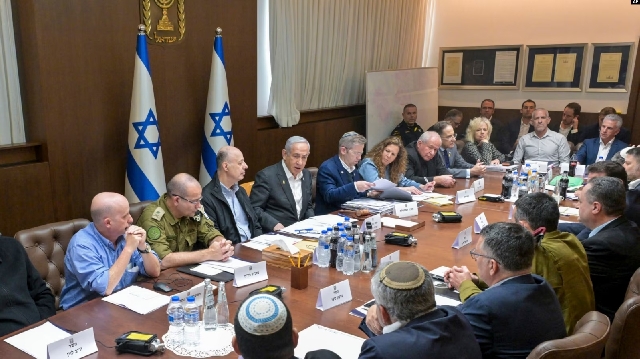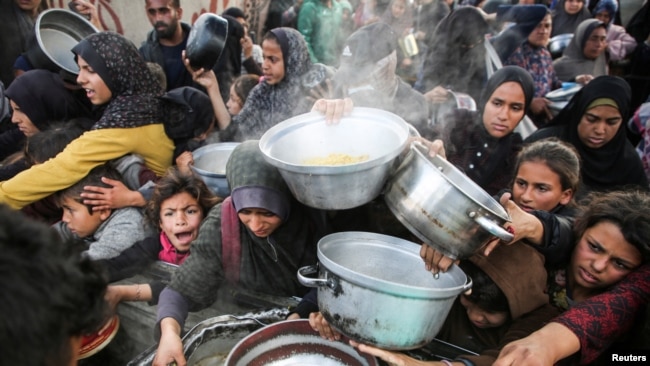Israeli Cabinet approves Gaza ceasefire deal
 In this photo provided by the Israeli Government Press Office, Prime Minister Benjamin Netanyahu, center, meets with his security Cabinet to recommend a ceasefire deal to pause the 15-month war with Hamas in Gaza, in Jerusalem, Jan. 17, 2025
In this photo provided by the Israeli Government Press Office, Prime Minister Benjamin Netanyahu, center, meets with his security Cabinet to recommend a ceasefire deal to pause the 15-month war with Hamas in Gaza, in Jerusalem, Jan. 17, 2025
Israel’s Cabinet approved a deal early Saturday for a ceasefire in Gaza and release of hostages that would pause 15 months of war with Hamas.
The government announced the deal around 1 a.m. local time in Jerusalem after the Cabinet met for more than six hours and after the security Cabinet recommended on Friday that the deal be approved.
The meeting by the full Cabinet went well past the start of the Jewish Sabbath, which begins at sundown on Friday. During the Sabbath, the government usually halts all business except in emergency cases of life and death, indicating the importance of the agreement.
The ceasefire will go into effect on Sunday and will feature a three-week pause in fighting and the release of dozens of Israeli hostages and hundreds of Palestinian prisoners.
The Israel Prison Service said Friday it was taking measures to prevent any “public displays of joy” when Palestinian prisoners are released as part of the Gaza ceasefire deal.
In this first phase, Israeli troops will pull back to the edges of Gaza, and many Palestinians will be able to return to what remains of their homes as increased aid flows into the besieged enclave.
Hamas said on Friday that there were no longer any barriers to the agreement. The United States, United Kingdom, European Union and others have designated Hamas as a terror organization.
Outgoing U.S. President Joe Biden said on Thursday in an interview with MSNBC that Israeli Prime Minister Benjamin Netanyahu “has to find a way to accommodate the legitimate concerns” of Palestinians for the long-term sustainability of Israel.
The United Nations says at least 1.9 million of the 2.3 million people living in Gaza have been displaced and 92% of housing units have been destroyed.
The World Health Organization, or WHO, said on Friday that it should be possible to increase aid imports into Gaza to around 600 trucks per day under the ceasefire agreement.
 | Palestinians gather to receive food cooked by a charity kitchen, before a ceasefire between Hamas and Israel takes effect, in Khan Younis, in the southern Gaza Strip, Jan. 17, 2025
| Palestinians gather to receive food cooked by a charity kitchen, before a ceasefire between Hamas and Israel takes effect, in Khan Younis, in the southern Gaza Strip, Jan. 17, 2025
“I think the possibility is very much there and specifically when other crossings will be opened up,” Rik Peeperkorn, WHO representative for the Occupied Palestinian Territory, told a Geneva press briefing. “This can be built up very rapidly.”
Peeperkorn also said he expected the ceasefire to allow for more medical evacuations for the more than 12,000 patients on the waiting list. Around one-third of the people on the list are children.
“We hope now with the ceasefire process that this will be better facilitated and supported,” he said.
The war in Gaza began when Hamas launched an attack on Israel on Oct. 7, 2023, killing more than 1,200 people and abducting about 250 hostages. Of those hostages, just under 100 are thought to remain in Hamas custody, but about one-third are believed to be dead.
Gaza authorities say nearly 47,000 Palestinians, mostly women and children, have been killed in subsequent Israeli military operations. Without providing evidence, Israel says the death toll includes thousands of militants it has killed.
Some information in this report came from Reuters and Agence France-Presse.
Source: voanews.com
Trending World

Kenyan court suspends 'landmark' US health aid deal over data privacy concerns
15:56
About 200 West African soldiers in Benin for 'clean-up' after failed coup
15:58
Ethiopia arrests nine TikTok creators in social media crackdown
15:56
Germany accuses Russia of 2024 cyber-attack and disinformation
15:50
Russia hits back at Europe's big plan to loan Moscow's frozen cash to Ukraine
15:48
Reddit launches High Court challenge to Australia's social media ban for kids
11:30
Five arrested over plot to attack German Christmas market
14:05
Dozens killed in Morocco flash floods
15:29
Ugandan army admits holding priest who'd been missing for days
15:27
US designates Colombian cocaine gang a terrorist group
22:08




